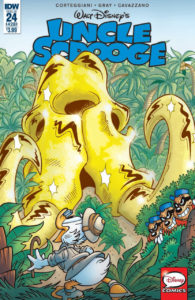 Sarah Gaydos joined Oni Comics in June as the Editorial Director of Licensed Publishing. Previously, she edited IDW’s Star Trek line, and oversaw properties owned by Disney, Hasbro, Dreamworks, and more.
Sarah Gaydos joined Oni Comics in June as the Editorial Director of Licensed Publishing. Previously, she edited IDW’s Star Trek line, and oversaw properties owned by Disney, Hasbro, Dreamworks, and more.
Sarah sat down with us to answer questions about working on licensed comics, and what creators need to know when deciding to work on them.
Today, we pick up our conversation to discuss what creators need to know about licensing on a more personal level. This is based on her over seven years of experience with licensed comics at three different companies.
Did you miss part one? Read Licensed Comics 101: The Publishing Side.
Creator Resource: How can creators, especially artists, prevent their art from being licensed out without their consent or knowledge?
 Sarah Gaydos: If you work with a comic company, say IDW, doing a cover or anything else, on a project that contains IP owned by a different company (example: Jem and the Holograms, owned by Hasbro), you are always opening yourself up to your work being used in ways other than the comic content you are initially working on. So, the easiest way to never run across this issue is to only work on your own IP, to be blunt.
Sarah Gaydos: If you work with a comic company, say IDW, doing a cover or anything else, on a project that contains IP owned by a different company (example: Jem and the Holograms, owned by Hasbro), you are always opening yourself up to your work being used in ways other than the comic content you are initially working on. So, the easiest way to never run across this issue is to only work on your own IP, to be blunt.
CR: How can creators ensure that if their art is being licensed out, they’re being compensated for it with a licensing fee or royalties?
SG: Ask your editor before you agree to the project.
Here are some sample questions: “I understand this is a work for hire project. Are there opportunities for reuse fees if my art is used elsewhere, or royalties? If so, what are they?”
Quite frankly, much of the time, the answer is going to be no, in my experience. However, let’s look at it as if the answer is yes. If a cover is used for a shirt, for example, the company may cut you a separate check, as a reuse fee, but you still own nothing. If a story you wrote has royalties on it, that still means you own nothing, but you will get a specified percentage of sales in addition to your rate.
Once your editor comes back to you with an answer on those things, you can make an informed decision to move forward with that project or not. It is safe to assume, though, that standard work for hire contracts allow reuse, with no additional monies owed to you, in any way the original IP holding company sees fit. If you decide to move forward with the project, then you are working under the full awareness of the situation.
I would also suggest, even after you talking with your editor, to see the work for hire contract and make sure you that what you agreed upon in writing, matches up with what’s in the contract.
CR: What can editors do to help creators understand their contracts and what they are signing on for?

SG: After this week, I’m going to redouble my efforts to make sure that everyone is aware of the situation, because clearly we’re not doing a good enough job. This is all spelled out in a proper work for hire contract, but legal documents are difficult—for me, too! The next big hurdle, if you do agree to it, and you do get a reuse fee, is to make sure you know if it is getting reused.
The art goes into an art pool, and the folks that do the licensing are not the same folks who work in consumer products who make the shirt—and neither of these people are your editors. Licensing professionals need to be better about closing this gap in communication. It is not ideal, even if you’re NOT getting a reuse fee, to find out just by looking online that your art has been reused.
CR: How can creators protect themselves?
SG: If you do not get a satisfactory answer, walk away. Get everything in writing.
CR: Thank you so much for your time, Sarah. Before you go, what is one piece of advice you wish you had heard when you started out in the industry?
SG: I think folks have a great resource that I did not when I started out, which is a super rich social media landscape, so this information can be shared!
- Licensed Comics 101 with Sarah Gaydos: The Creator’s Side - July 17, 2018
- Licensed Comics 101 with Sarah Gaydos: The Publishing Side - July 16, 2018
- Apps for Mindfulness and Mental Health - June 12, 2018